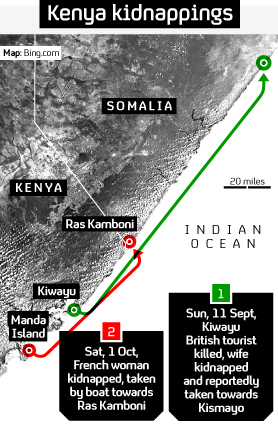Kenyans step up search for French hostage
As a French woman is kidnapped in a tourist resort near the Somali border, weeks after a similar incident nearby, the International Maritime Bureau say ‘governments need to step up.’

Sixty-six-year-old Marie Dedieu was abducted by 10 heavily armed bandits, who arrived by motor boat in the Lamu archipelego on Saturday, and was taken across the nearby border into Somalia, according to Kenyan officials.
A Kenyan government statement said: “An elderly, disabled French lady who has been living in Manda Island in her own house was abducted by 10 heavily armed Somali bandits suspected to be al-Shabaab operatives from Ras Chiamboni in Somalia, near the Kenyan border.”
Two coastguard vessels and a police helicopter chased the kidnappers, injuring “several’ abductors”, Internal Security Minister George Saitoti said in a statement.
According to witness accounts, one of the gunmen grabbed Ms Dedieu and carried her to a waiting boat.
Her Kenyan boyfriend, John Lepapa, said: “All they were saying was ‘Where is the foreigner? Where is the foreigner?'”
On Monday, Kenyan police officials were questioning a member of Dedieu’s staff,according to the AFP news agency.
“The man we have in custody was working at the woman’s home and he is assisting us with the investigation,” said a police source speaking to AFP on condition of anonymity.
“There are aspects we want him to clarify to us because he is crucial in this investigation,” he added.
The government said “every effort” was being made to rescue the woman, amid fears the abduction could hurt Kenya’s tourism industry, which brings in an estimated £800m annually (4.5 per cent of total GDP) and around £2bn (11.6 per cent) to the wider economy.
Read more: Foreign Office advises Britons to stay away from Kenya coast
Kidnapping in context
Ms Dedieu is one of 273 currently held as hostage apparently by pirates in and around the coast of Somalia, according to the International Maritime Bureau, who act as a focal point for advising on world piracy.
Whilst the body doesn’t class Ms Dedieu’s abduction as an act of piracy, as it happened on land, Cyrus Mody from the IMB told Channel 4 News: “The known hostages are an absolute mixtures, they are different nationalities but are primarily work on merchant ships.”
“We have seen 15 deaths this year but eventually most get released,”
“International trade is being affected very severely and international governments and the community has to step up and take more action,” Mr Mody said before emphasising that efforts are in place, but need to be ‘stepped up.’
Briton kidnapped
The abduction comes three weeks after British tourist Judith Tebbutt was kidnapped and her husband was murdered in the remote village of Kiwayu, near the Somalian border.
The 56-year-old woman from Hertfordshire was taken in a boat north towards Kismayo, a main port city in southern Somalia, shortly after her husband was shot dead, according to Kenyan officials and witnesses.
Some Kenyan officials suspected al-Shabaab – the Islamic group which controls much of central and southern Somalia – of carrying out the abduction.
But al-Shabaab denied involvement.
A week after the attack a Kenyan man, Ali Babitu Kololo, appeared in court charged with kidnapping and violence.
He denied the charges and said he had been forced at gunpoint to help the gang that seized Ms Tebbutt and killed Mr Tebbutt.
Read more: Kenyan denies kidnapping British holidaymaker

The ‘Somali issue’
Kenya’s authorities are under pressure at home to beef up their defences against more cross-border and sea-based attacks which threaten the country’s tourism industry.
Kenyan Tourism Minister Najib Balala called for immediate international action to help authorities secure the border with Somalia.
“The core problem is Somalia and the core problem is criminal elements who manage to sneak into the country,” he said.
“Whatever we’re going to do, if we don’t have the support of the international community to address the Somali issue, then it is very challenging to manage to man the border in Somalia.”
Since the kidnapping of Ms Dedieu (see photo above), Abdalla Fadhil, a local investor and the owner of the land on which the Frenchwoman had her house built, said Lamu’s hotels have recorded some 300 cancellations.
An exodus of tourists would be a “disaster” for the community as the local economy is 90 per cent dependent on tourism, he told a press conference organised around local political and economic figures.
He insisted the kidnapping was an “isolated incident”. It had happened, he said, because no-one was prepared.